A Research Paper By Jonathon Regan, Transformation in Education Coach, NETHERLANDS
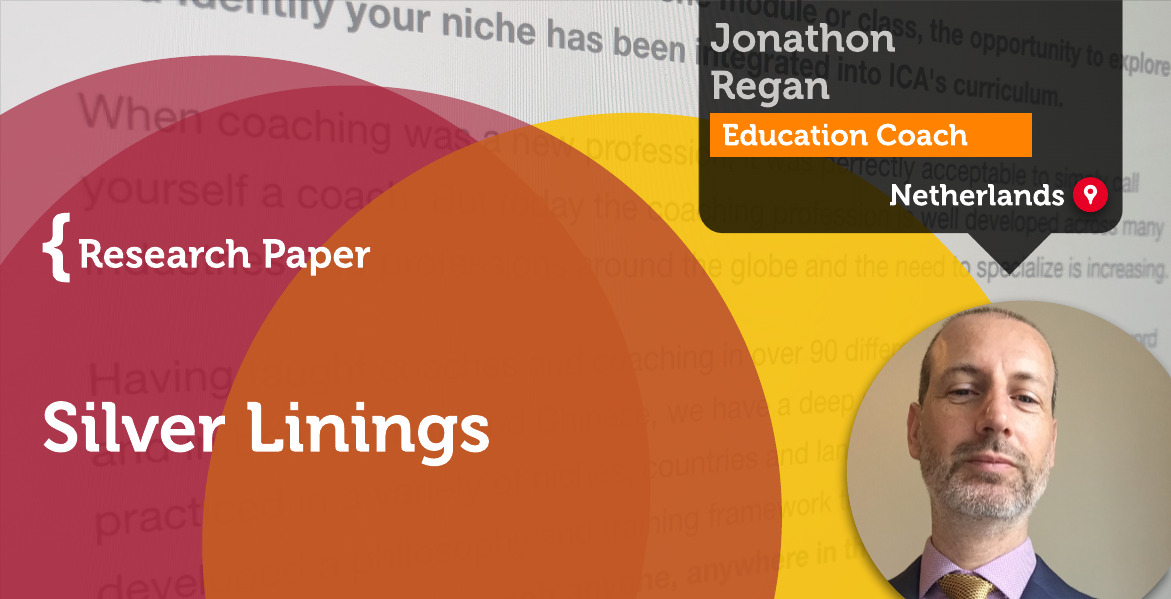
Forward
This paper serves as a reflection on my personal journey navigating the pandemic that hit in 2020. It starts with my efforts to make a positive contribution in supporting my community, where unsung heroes battled through disruption.
By retelling the story, I hope to show how I came to coaching and how a year’s study has provided me with skills to make a better contribution. I also wish to highlight the continued successes of my tribe.
Celebrating the Silver Linings
March 2020 was a difficult time for everyone in education: students, teachers and parents alike. As a school leader, I saw at first hand how hierarchies snapped tight in response to the pandemic and the barrage of problems it brought. Every day, with fresh information or top down directive, decisions were made to navigate the storm. Education, though changed, battled on.
Success however was not entirely the result of great leadership – and why should it be? The pandemic was as much a surprise to the top of the hierarchy as it was to those at the bottom. In so many of the conversations I had in the first year of the pandemic, I was struck by the efforts of folk at every level to try new things and succeed in new ways. Hats off especially to the quiet innovators, whose voices are not normally heard.
That is not to say that all people found it easy to adapt. It is important to acknowledge that everybody was affected by the Pandemic, to a lesser or greater degree depending on geography, educational culture and wealth. All of us faced challenges as we confronted isolation, fear, illness, lost income, and grief. The bad news was live streamed to us by the numbers each day. Dark times.
To me, it seemed that better news was something everyone could do with a bit more of. I wondered that in the rush to put out fires, we might miss the opportunity to celebrate all of the little wins and acknowledge the people responsible for them. With the loss of my own job to the crisis, it felt like a good time to focus on the wellbeing of my family, catch up on study, and take time to contribute to ongoing conversation around education in new ways.
March 2021, I decided to invite colleagues, friends and thought leaders to mark the first anniversary of the Coronavirus pandemic by sharing their experiences in guided conversation over a virtual coffee. My intention was simply to help highlight the Silver Linings found in disruption. Each conversation was informal, but started with a simple question: “What are you doing now that you were not doing a year ago?” The resulting conversations were published on social media and shone a small light on the brilliance of educators: their resilience, creativity and capacity for innovation.
Another year on, despite the pandemic still raging globally, some parts of the world are seeing a relaxing of the restrictions that made teaching and learning especially difficult. March 2022 seems like a great time to reach out my brain-trust and check on their progress. I was curious to know: Are they glad to get back to normal, or happy moving forward in their new normal? Or maybe something else? What Post-pandemic Superpowers do they now possess?
Like Silver Linings, these recent conversations were informal, though I was able to add my ICA experience as a professional listener, adhering to International Coaching Federation standards. Underlying each new conversation is a framework of questions, posed in a way that does not impede a natural flow, but that allows for exploration and reflection. The conversations this time do not focus on learnings solely around ‘the what’, they now have a much stronger focus on ‘the who’.
The following pages give context to this recent set of conversations and demonstrate how the questions I used in the coaching framework were developed.
Disruption is not a set back, it’s an opportunity.
The (ongoing) pandemic of 2020 was an example of the volatile, uncertain, complex and ambiguous nature of our world. Difficult to foresee, difficult to respond to – ‘a wicked problem’. For educators at all levels, the systems and processes that served us before lost relevance and new norms appeared in the vacuum left by disruption. Change is difficult in the best of circumstances, but 2020 was unprecedented: 1.6 billion students and 60 million teachers unable to physically attend their classes.
Familiar with the adage “Never let a good crisis go to waste”? It is characterised by challenge, resilience, adaptability, reflection, ultimately leading to a new and enhanced condition. It implies that those who have endured major disruption may have been gifted an opportunity to thrive, though the innate human tendency after disruption is to get back to normal as quickly as possible!
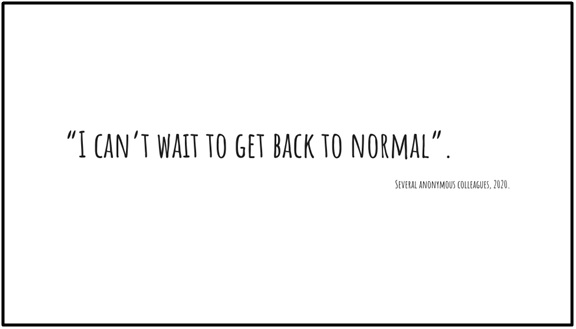
Avoiding a return ticket to Normalville.
If you think about your experience of the recent pandemic and consider the disruption that it has caused in your life, you may be surprised to find that you are now doing quite well actually! That’s because you leaned on skills and values that allowed you not only to navigate the storm, but to thrive. Let’s call them your Pandemic Superpowers – It might be that you modelled them to those around you: your boss, your team, those in your care and in doing so, helped them too. Revealing your Post-pandemic Superpowers is intended to help you move from ‘now’ to ‘next’ with confidence. Fundamentally, it is intended to draw your full attention to the strengths you lean on by asking:
- What you have learned about yourself from the recent crisis that will provide value moving forward.
- How your learning might affect your response in the next disruption you encounter.
Post-pandemic Super Powers
Educators, entrepreneurs, futurists, parents and provocateurs have been scratching their heads to answer this sticky question: What are the right skills and attributes that might help all people thrive in the future? The 3 Rs’? The four C’s? 21st-C skills? Real skills? Soft skills?
As a moderator for an online community of educators, I have looked at the responses, literally hundreds and hundreds of them – seems like everyone has their own idea of what’s most important. Perhaps teacher ‘X’ can impart amazing learning about AI empathy, or leader ‘Y’ engages their community around gender sensitivity, but I can’t – it’s not on my list! And that got me thinking…
What if, instead of looking to find a cure-all list, we looked inward to uncover the skills that help us thrive as individuals? The answers should be fairly accessible given that we have all been navigating the same two years of volatility, isolation, fear and uncertainty. So I called on my brain trust and asked them.
Below is a single page prompt that I used during each of the Post-pandemic Super Powers conversations. On the left of the page, you will see some of the original slides used in Silver Linings, though they have since been revised and reordered for this current purpose. On the right of the page, you can read the questions that helped guide each conversation.
In some instances, questions were rephrased or omitted to ensure a natural flow to the conversation.
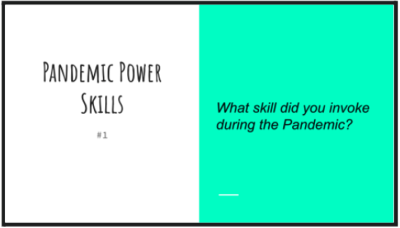
What’s new since Silver Linings?
What is your current destination?
Where are you right now?
What is working well?
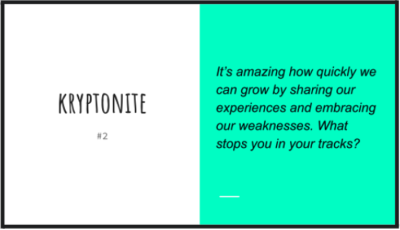
What is slowing you down?
What obstacles might be hidden?
What do you need more of?
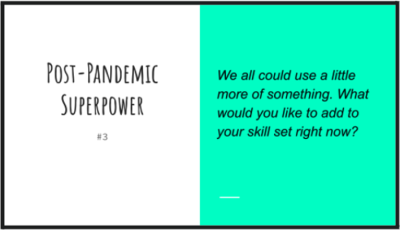
What superpower might get you to the other side of that fear?
Where might you find strength and support?
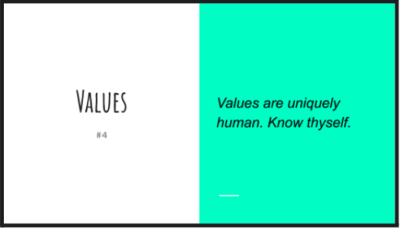
What strengths got your this far?
Which of your values might support that strength?
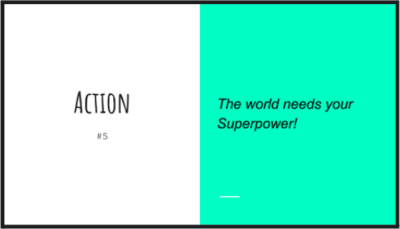
New and Improved?
Most definitely. The preparation that I had made for these conversations have given me the confidence to guide. In contrast to the Silver Lining nice chats over a coffee, the Post-pandemic Superpower conversations went beyond reflection about solutions born of disruptive circumstances and looked far deeper towards the skills and values that lead us to decisions. Each conversation generated a fresh perspective by exploring how these skills and values would be applied in the near future. The following comments are representative of the feedback I received:
Discussing a new career path:
“The conversation was really structured and that made it easy to talk and make connections. I talked a lot, but things are much clearer in my head right now. There was a confidence that you had in guiding the conversation that was not as obvious last time.”
Discussing schooling for temporarily displaced Ukrainians:
“This has allowed me to really reflect deeply – we don’t get that opportunity in real life!”
Discussing technology strategy in school:
“I have been thinking about these things, but this conversation has provided focus. I hadn’t thought like this before, in such a structured way. I have a feeling that someone will soon ask me what the school’s tech strategy should look like moving forward. Now it’s going to be a lot easier to give them an answer!”
So, what has been learned?
I am happy to conclude that my intention to celebrate innovation and resilience through Silver linings has levelled up. By undertaking a second round of conversations called Post-pandemic Super Powers, I add action based research to underpin my coaching niche: Coaching for Lifelong Learners and Leaders. This fits neatly within the parameters of my model: A design thinking approach to coaching: Solutions-building, not just problem-solving.
I look forward to continuing these conversations, perhaps in their current form or as part of a workshop with wider remit. In conjunction with my Power Tool, Disruption vs. Silver linings, this presents exciting prospects for even deeper exploration and reflection for future clients.
Reflecting on my own learnings from this process, and the stories shared with me, I have some fresh perspective of my own. No matter where I am in life, the strategic decisions I make should never be fixed; they are just choices about the next step, the next iteration of the journey. I will continue to take a creative approach and apply design thinking to decisions by developing agile strategies with robust frameworks containing flexible components.
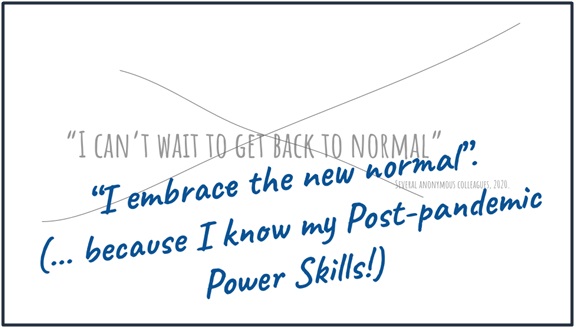
Thinking about a transition consultant? You might be better off with a bold coach.